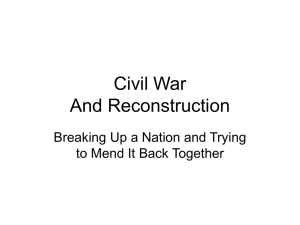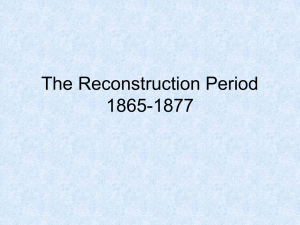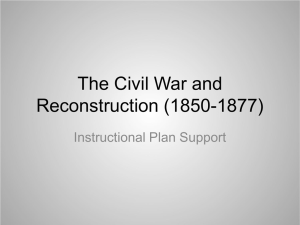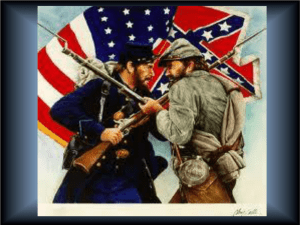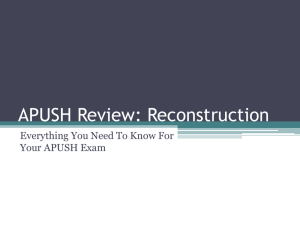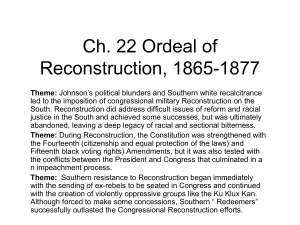CH04_5Pres
advertisement
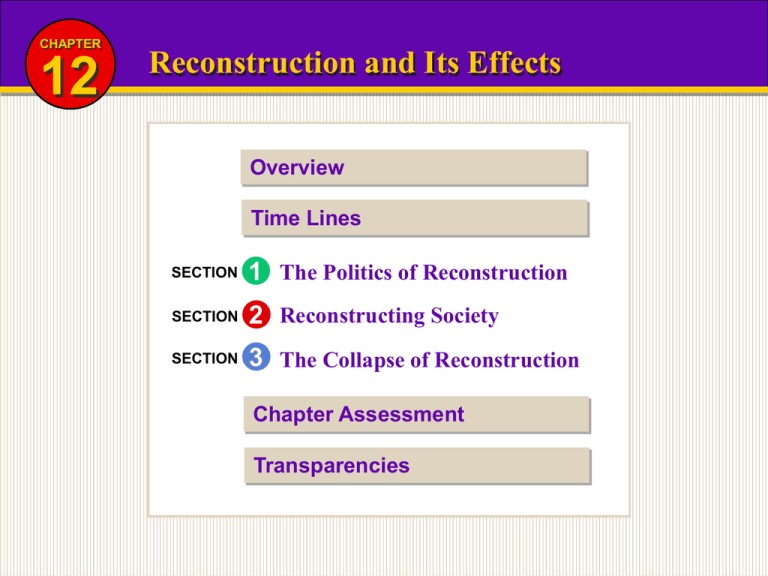
CHAPTER 12 Reconstruction and Its Effects Overview Time Lines SECTION 1 The Politics of Reconstruction SECTION 2 Reconstructing Society SECTION 3 The Collapse of Reconstruction Chapter Assessment Transparencies CHAPTER 12 Reconstruction and Its Effects “Nothing in all history [equaled] this wonderful, quiet, sudden transformation of four millions of human beings from . . . the auction-block to the ballot-box.” William Lloyd Garrison, abolitionist THEMES IN CHAPTER 12 Constitutional Concerns Civil Rights Expanding Democracy Cultural Diversity HOME CHAPTER 12 Reconstruction and Its Effects “Nothing in all history [equaled] this wonderful, quiet, sudden transformation of four millions of human beings from . . . the auction-block to the ballot-box.” William Lloyd Garrison, abolitionist What do you know? • What does the word reconstruction mean to you? Read the quote above and answer the following: • Who were the four million that Garrison was talking about? • What does his opposition of auction-block and ballot-box refer to? HOME CHAPTER 12 Time Line The United States 1865 Thirteenth Amendment is ratified. 1867 U.S. buys Alaska from Russia. Former Confederate states are divided into military districts. 1868 President Johnson is impeached. Fourteenth Amendment is ratified. 1870 Fifteenth Amendment is ratified. 1871 U.S. and Great Britain sign Treaty of Washington. 1873 Financial panic results in economic depression. 1875 Specie Resumption Act is passed. 1877 Federal troops withdraw from the South, ending Reconstruction. HOME CHAPTER 12 Time Line The World 1866 Austro-Prussian War ends. 1867 Emperor Maximillian is executed in Mexico. 1869 Mohandas K. Gandhi is born in India. 1870 Unification of Italy is completed. 1871 Germany becomes unified under Kaiser Wilhem I. 1874 British declare Gold Coast of Africa a colony. 1876 Japan forces Korea to open ports to trade. HOME SECTION 1 The Politics of Reconstruction HOME Learn About presidential and congressional Reconstruction policies from 1865 to 1870. To Understand how political leaders set out to rebuild the nation after the Civil War. SECTION 1 The Politics of Reconstruction Key Idea Presidents Lincoln and Johnson face congressional opposition to their Reconstruction plans. Congress wins control, and Radical Reconstruction begins. HOME SECTION 1 The Politics of Reconstruction HOME Section 1 Assessment SYNTHESIZING What are some events, plans, or legislation that attempted to enact Reconstruction? Fifteenth Amendment Impeachment of Johnson Reconstruction Act of 1867 Lincoln’s Ten-Percent Plan Reconstruction attempts Fourteenth Amendment Wade-Davis Bill Attempts to continue and enlarge the Freedman’s Bureau Civil Rights Act of 1866 SECTION 1 The Politics of Reconstruction Section 1 Assessment HYPOTHESIZING Describe how Reconstruction might have been different if Abraham Lincoln had lived. THINK ABOUT • Lincoln’s plan for Reconstruction • Lincoln’s relationship with Radical Republicans • Lincoln’s ability to negotiate HOME SECTION 1 The Politics of Reconstruction Section 1 Assessment MAKING DECISIONS Were the Radical Republicans justified in impeaching President Johnson? THINK ABOUT • the controversy over Reconstruction policies • the meaning of the Tenure of Office Act • Johnson’s vetoes HOME SECTION 2 Reconstructing Society HOME Learn About the political, social, and economic changes that took place in the South following the Civil War. To Understand the roles that various groups played in the rebuilding of Southern society. SECTION 2 Reconstructing Society Key Idea The South must rebuild its ravaged economy in the aftermath of war. African Americans begin to exercise freedoms denied to them during their enslavement. HOME SECTION 2 Reconstructing Society HOME Section 2 Assessment SUMMARIZING What were some of the problems facing the South after the Civil War and the attempted solutions? PROBLEM ATTEMPTED SOLUTION Physical devastation Public works programs Former slaves separated from their families Search for family members Lack of education New schools established Lack of land Southern Homestead Act Labor shortage Sharecropping or tenant farming SECTION 2 Reconstructing Society Section 2 Assessment GENERALIZING How did the Civil War weaken the Southern economy? THINK ABOUT • the devastation of the war • economic conditions • changes in agriculture HOME SECTION 2 Reconstructing Society Section 2 Assessment INTERPRETING Which accomplishment of African Americans during Reconstruction do you consider most significant? THINK ABOUT • the development of a free African-American community • the lingering effects of slavery • opportunities for leadership HOME SECTION 3 The Collapse of Reconstruction Learn About the political, economic, and social problems that plagued the nation from 1873 to 1877. To Understand why Reconstruction ultimately collapsed. HOME SECTION 3 The Collapse of Reconstruction Key Idea Continued opposition to Radical Reconstruction in the South and economic problems in the North bring the Reconstruction process to an end. HOME SECTION 3 The Collapse of Reconstruction HOME Section 3 Assessment SUMMARIZING What were some of the major events that led to the collapse of Reconstruction? 1866 Ku Klux Klan founded. 1870–1871 Enforcement Acts passed. 1872 Amnesty Act passed. 1872 Crédit Mobilier. 1873 1873 Panic. 1876 Hayes elected president. 1873 Supreme Court issued Slaughterhouse rulings. SECTION 3 The Collapse of Reconstruction Section 3 Assessment ANALYZING Would the Republican Party have remained strong in the South if Congress had not passed the Amnesty Act? THINK ABOUT • the Republican commitment to Reconstruction • the goals of the Ku Klux Klan • the political and economic crises facing the nation HOME SECTION 3 The Collapse of Reconstruction Section 3 Assessment EVALUATING Was the political deal to settle the election of 1876 an appropriate solution? Why or why not? THINK ABOUT • the causes of the conflict over the election • other possible solutions to the controversy • the impact of the settlement HOME Chapter 12 Assessment 1. How did Andrew Johnson’s plan to reconstruct the Confederate states differ from Lincoln’s? 2. How did the Civil Rights Act of 1866 become law? 3. Why did the Radicals want to impeach Andrew Johnson? 4. What factor played a significant role in the 1868 presidential election? 5. What three groups made up the Republican party in the South during Reconstruction? HOME Chapter 12 Assessment 6. In what ways did emancipated slaves exercise their freedom? 7. How did white landowners in the South reassert their economic power in the decade following the Civil War? 8. How did Southern whites regain political power during Reconstruction? 9. What economic and political developments weakened the Republican party during Grant’s second term? 10. What significance did the victory by Rutherford B. Hayes in the 1876 presidential race have for Reconstruction? HOME

